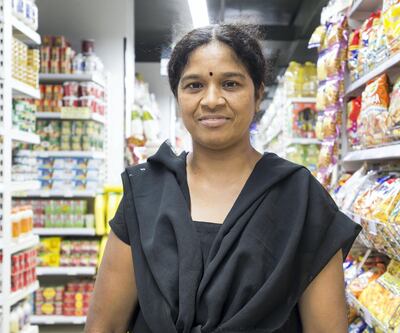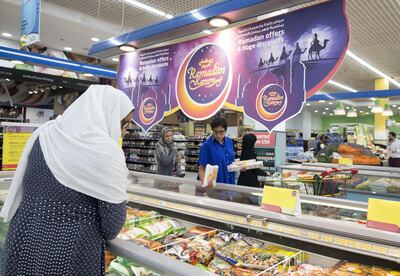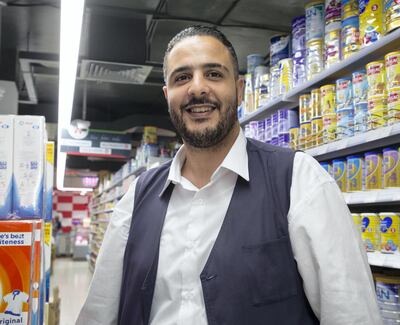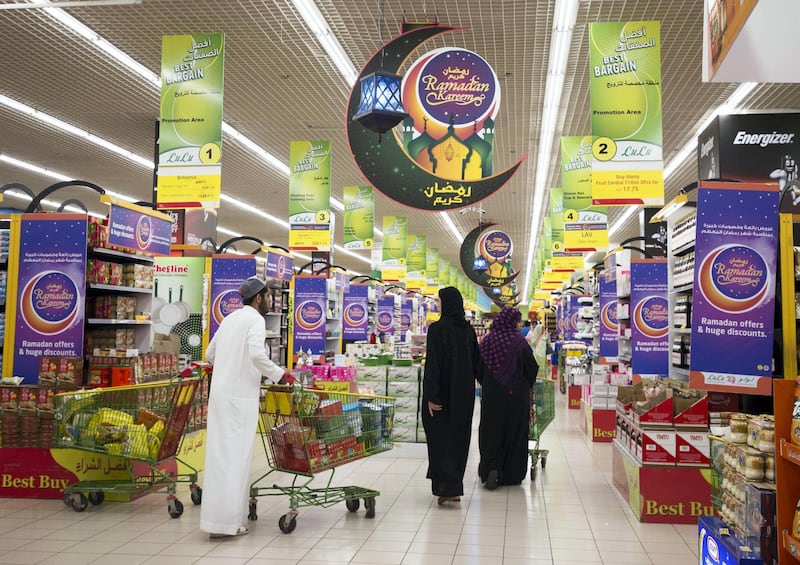As shoppers crowded out supermarkets in Abu Dhabi on the day before the eve of Ramadan, one thing was evident from the contents of their shopping trolleys: families are cutting down on sugar.
Shoppers said they would reduce their intake of the sugary drinks that have become Ramadan staples, such as Vimto and Tang.
Families said that, this year, they would stock up on supplies as the month rolled on rather than stock piling in advance and potentially accumulating too much food.
Um Ameera, 37, shopping in Carrefour, filled her trolley with vegetables, tomato paste, flour and tanks of olive oil.
"I am buying the necessary items for green and fruit salads" but products have become too expensive at supermarkets, she said.

She held up a small can of lentils from her trolley saying it was the best thing she found for Dh3. But her 400 gram bag of mixed nuts will cost her more than Dh41.
While the Emirati mother and her husband have not set a budget for Ramadan, she said they have generally cut down on spending every month.
“Last month we spent around Dh5,000. We are a small family: only myself and my three daughters, a housemaid and cook. My husband only comes home for the weekend so he barely eats twice at home.”
Um Hamad and her husband are adopting a similar approach of only shopping when they need specific items.
"I only got more packaged Ramadan items like custard and jelly," said the 33-year-old engineer.
She said that for the first time she would not be buying sugary fizzy drinks during Ramadan.
“I have heard how much added sugar it has and it is not beneficial in anyway.
“If I put it on the table, my sons will not eat anything else,” said the Emirati mother of three.

She and her husband have not set a budget for Ramadan but they intend to avoid overcooking to minimise potential food waste.
“The new generation is now more aware but if we go to my mother’s house, you find a massive banquet and the neighbours also send food.”
Rawan Fawah and her husband, Ali Hassan, weaved their way through the congested aisles at Carrefour in Marina Mall.
“It is so crowded and there are leftover boxes of food on the floor everywhere,” said the 27-year-old housewife from Gaza.
“All the offers are already sold out, so I just went for the regular soup bags.”
In Dubai, Mrs Iqbal Obaid pushed a trolley piled high with food and drinks. The 61-year-old Jordanian housewife was stocking up.
“My three sons and 10 grandchildren visit me constantly during the holy month. I buy lots of food during Ramadan. My family and I prefer to eat meals cooked at home,” said Mrs Obaid.

Like many shoppers, Mrs Iqbal prepares certain dishes during Ramadan that she would not ordinarily make.
Among them are mansaf – a Jordanian dish made of lamb cooked with fermented dried yogurt and served with rice.
“It is one of the famous dishes I must cook during Ramadan,” said Mrs Iqbal, who took advantage of the promotions in Deira City Centre’s Carrefour.
Dozens of families flocked to grocery shops, most of them leaving with trolleys piled high with supplies.
A large rice bag, which was previously sold for Dh66 and is now being sold at Dh26, proved to be very popular among Ramadan shoppers.
Dr Loay Sami, from Iraq, said he bought a bag and was very happy with the prices.
_______________
Read more on Ramadan 2018:
UAE announces first day of Ramadan 2018
Ramadan FAQs: all you need to know about the holy month in the UAE
Male motorists more likely to cause accidents in holy month
_______________
Mohammed Nabil, 37, an Egyptian expatriate, said: "Everyone thought groceries would be more expensive because of VAT. The current prices of goods are similar to those listed last year. For some products, it's even cheaper."
He said he shares his accommodation with other men in Deira.
“In Ramadan, we all get together for iftar. Sometimes we prepare traditional meals, like koshari, or order meals from restaurants.”
Non-Muslim expatriates also celebrate Ramadan in their own unique ways and enjoy the discounts.
Rama Anud, from India, is one of those who takes advantage of Ramadan offers.
"I bought vegetables, rice, yogurt, milk and many other things. I shopped yesterday and I am shopping today."
Sima Ahmadifar, a 9-year-old Iranian girl with her mother, said luqaimat was a popular dessert at home she was looking forward to.
“My mother buys more stuff in Ramadan as she cooks so many dishes for iftar.”






